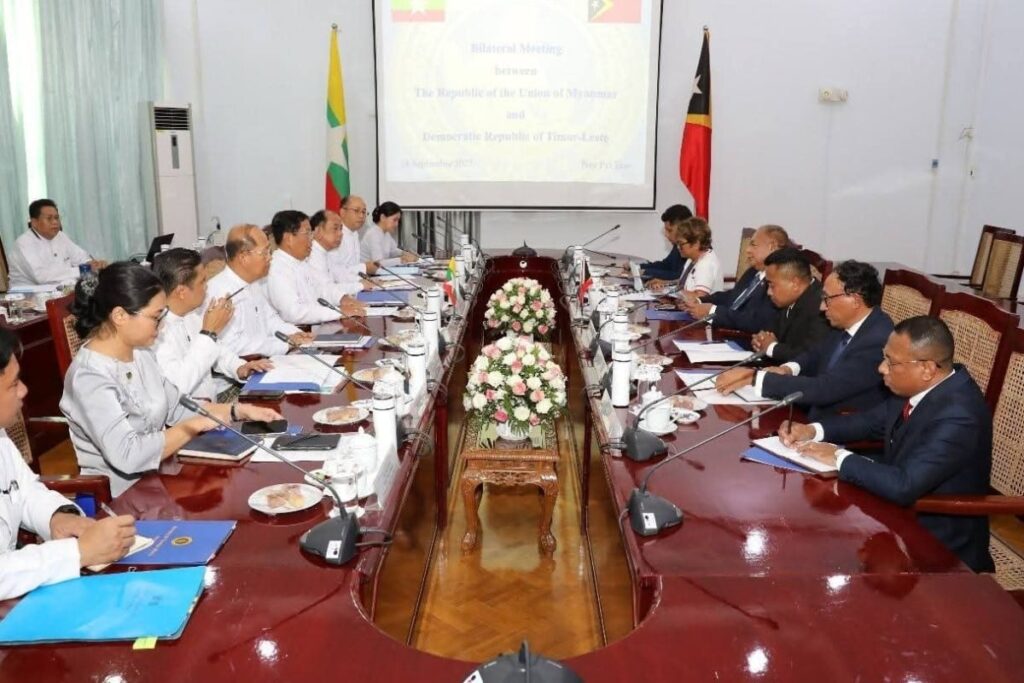
East Timor’s ASEAN Gamble: Mending Ties with Myanmar’s Junta for Membership
Introduction
East Timor, officially known as Timor-Leste, has long aspired to join the Association of Southeast Asian Nations (ASEAN). After decades of waiting on the sidelines, the country is finally on the cusp of gaining full membership. Yet, the road has been anything but smooth. In a dramatic diplomatic pivot, East Timor has softened its stance toward Myanmar’s military junta, raising both eyebrows and questions about what this move means for ASEAN’s future, regional diplomacy, and the bloc’s credibility on human rights.
This article explores East Timor’s changing position, the context of its ASEAN bid, the reactions across Southeast Asia, and the broader implications for ASEAN’s fragile unity.
A Long Road to ASEAN Membership
East Timor declared independence from Indonesia in 2002 after years of conflict and international intervention. Since then, it has sought regional integration, recognizing ASEAN as the most important political and economic forum in Southeast Asia.
2002: East Timor gains independence.
2011: Dili officially applies for ASEAN membership.
2022: Granted observer status in ASEAN.
2025: On track for full membership at the 47th ASEAN Summit in Kuala Lumpur.
Yet, entry into ASEAN is not automatic. The bloc operates on consensus, meaning every member must agree. Myanmar’s military junta, which seized power in a 2021 coup, emerged as a potential spoiler, threatening to block East Timor’s accession.
East Timor’s Previous Stance on Myanmar
Until recently, East Timor was one of the region’s most vocal critics of Myanmar’s military regime.
In 2023, Myanmar expelled East Timor’s ambassador after Dili condemned the junta’s human rights abuses.
East Timor expressed public support for the National Unity Government (NUG), Myanmar’s shadow administration formed by ousted lawmakers.
Civil society groups in Dili held protests and solidarity events with Myanmar’s pro-democracy movement.
This moral clarity earned East Timor respect from rights advocates but placed its ASEAN membership aspirations in jeopardy.
The Diplomatic U-Turn
In September 2025, East Timor surprised many observers by recalibrating its position.
According to Myanmar’s Ministry of Foreign Affairs, East Timor:
Proposed the opening of a Myanmar embassy in Dili.
Assured Naypyidaw that it would not allow “illegal organizations” such as the NUG to operate on Timorese soil.
This reversal came just weeks before the October ASEAN Summit, signaling a pragmatic attempt to clear the last major hurdle to membership. Analysts suggest that Dili chose realpolitik over principle, prioritizing accession above values.
A Sovereign Choice or a Strategic Retreat?
ASEAN scholars argue that East Timor’s shift reflects the reality of regional politics.
Vu Lam, political analyst: “Dili would not want a potential hurdle to its long-awaited accession. This was a pragmatic move.”
Sharon Seah, ISEAS-Yusof Ishak Institute: “East Timor’s pledge is as much for the junta as for other ASEAN members. It signals a willingness to align with ASEAN’s official position.”
Matteo Piasentini, geopolitical analyst: “It may be unpalatable, but it is a sovereign choice that ASEAN usually respects.”
While some ASEAN members—such as Cambodia or Thailand—are likely to welcome the de-escalation, others such as Indonesia and Malaysia may be uneasy about Dili stepping back from its earlier pro-democracy position.
The Principle of Non-Interference
At the heart of this controversy lies ASEAN’s foundational principle: non-interference in the internal affairs of member states.
This principle has long shielded governments, including Myanmar’s junta, from regional scrutiny.
Critics argue it undermines ASEAN’s credibility, especially when dealing with human rights abuses.
Supporters counter that non-interference preserves unity in a region of diverse political systems.
By aligning itself with this principle, East Timor may have secured entry into the club, but at the cost of its reputation as a defender of democracy.
The Cost of Consensus
ASEAN’s consensus model often forces difficult compromises. For East Timor, the cost was dialing down its criticism of Myanmar.
This raises larger questions:
Does ASEAN value unity over human rights?
Can the bloc play any meaningful role in resolving Myanmar’s crisis?
What message does this send to other pro-democracy movements in Asia?
Political scientist Vu Lam warns that ASEAN’s approach “demonstrates the costs of prioritizing membership and regional consensus over support for democratic movements.”
What East Timor Brings to ASEAN
Despite the controversy, East Timor’s entry could enrich ASEAN in several ways:
Geostrategic Value: Located between Indonesia and Australia, East Timor occupies an important position in the Timor Sea.
Energy Potential: The Greater Sunrise oil and gas fields could bring economic opportunities for both East Timor and ASEAN.
Young Democracy: East Timor has held competitive elections since independence, offering ASEAN an example of democratic resilience.
Symbolic Expansion: Admitting East Timor shows ASEAN’s openness to new members after decades of static membership.
Myanmar’s Role and ASEAN’s Dilemma
Myanmar remains the most divisive issue within ASEAN. Since the 2021 coup:
Thousands have been killed in armed conflict.
Millions displaced internally and abroad.
International sanctions deepened Myanmar’s isolation.
ASEAN has struggled to respond effectively. Its Five-Point Consensus on Myanmar has stalled, with little progress in halting violence. East Timor’s willingness to compromise with the junta underscores ASEAN’s broader difficulty in balancing engagement with accountability.
Reactions from the Region
Malaysia & Indonesia: Likely uneasy but unwilling to block East Timor’s entry.
Singapore: Pragmatic, will weigh stability over ideals.
Thailand & Cambodia: More sympathetic to Myanmar’s junta, likely to welcome Dili’s new stance.
Civil Society: Activists in East Timor and Myanmar have criticized the pivot as abandoning democratic principles.
Looking Ahead: The October Summit
The upcoming ASEAN Summit in Kuala Lumpur (October 26–28, 2025) will be decisive. If consensus holds, East Timor will finally join as the 11th member of ASEAN.
But lingering questions remain:
Will East Timor’s compromise embolden the Myanmar junta?
Will ASEAN ever take a firmer stance on human rights violations?
Can the bloc maintain credibility while embracing realpolitik?
Conclusion
East Timor’s ASEAN dream is within reach, but the cost has been high. By mending fences with Myanmar’s military rulers, Dili has traded principle for pragmatism. While this ensures entry into ASEAN, it also exposes the bloc’s enduring contradictions—between unity and rights, sovereignty and democracy, pragmatism and principle.
As the region watches the October summit, one truth is clear: ASEAN’s future will be defined not just by who joins, but by what values the bloc is truly willing to defend.
Credit SCMP
❓ Frequently Asked Questions (FAQ)
1. Why does East Timor want to join ASEAN?
East Timor views ASEAN membership as vital for regional integration, economic growth, and stronger diplomatic ties with neighboring Southeast Asian countries.
2. When will East Timor officially join ASEAN?
East Timor is expected to be admitted as the 11th ASEAN member during the 47th ASEAN Summit in Kuala Lumpur on October 26–28, 2025, if consensus is reached.
3. Why did East Timor soften its stance toward Myanmar’s junta?
Dili shifted its position to ease Myanmar’s objections, signaling it would not allow opposition groups like the National Unity Government (NUG) to operate on Timorese soil.
4. How does ASEAN’s non-interference principle affect this issue?
ASEAN’s commitment to non-interference means members rarely challenge one another’s internal politics. This principle influenced East Timor’s decision to compromise with Myanmar.
5. What benefits will East Timor bring to ASEAN?
East Timor offers geostrategic value in the Timor Sea, potential energy resources, a young democratic system, and symbolic expansion for ASEAN’s credibility and outreach.
Related posts:
 ASEAN Rejects Myanmar’s Military Elections, Illegitimate
ASEAN Rejects Myanmar’s Military Elections, Illegitimate
 Thailand Extradites Shwe Kokko Tycoon She Zhijiang to China
Thailand Extradites Shwe Kokko Tycoon She Zhijiang to China
 Myanmar Military Paraglider Strike Kills Dozens
Myanmar Military Paraglider Strike Kills Dozens
 UN: Over 400 Rohingya Feared Dead in Two Shipwrecks Off Myanmar Coast
UN: Over 400 Rohingya Feared Dead in Two Shipwrecks Off Myanmar Coast
 U.S. POLICY ON MYANMAR
U.S. POLICY ON MYANMAR
 U.S. Identifies Myanmar and Other Nations in Annual Drug Report
U.S. Identifies Myanmar and Other Nations in Annual Drug Report
